


South Korean court issues warrant to arrest President Yoon.?The warrant expires on Jan 6.
Yoon declared emergency martial law on Dec 3, only to repeal it the very next day after the parliament voted against its implementation.
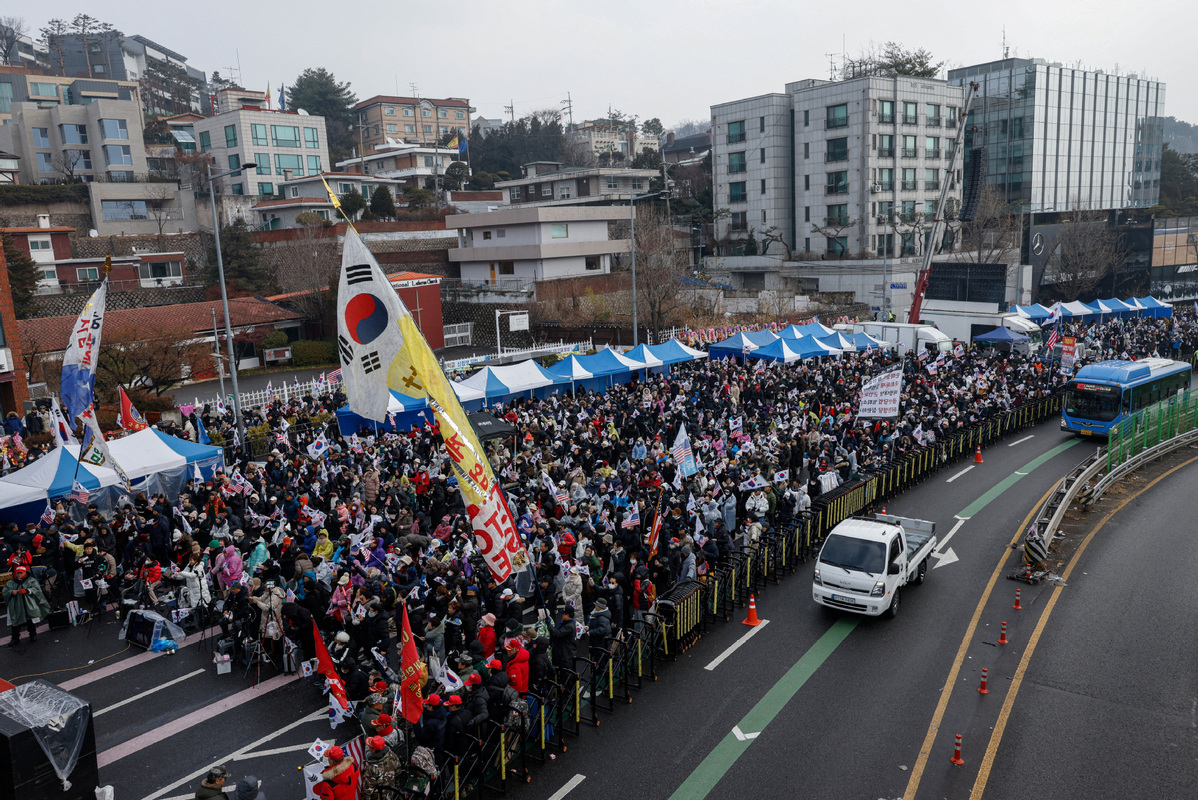
SEOUL -- South Korean prosecutors have indicted the country's defence intelligence commander over his role in impeached President Yoon Suk-yeol's failed attempt to declare martial law on Dec 3, Yonhap news agency reported on Monday.
Reuters
SEOUL -- South Korea's anti-corruption investigative agency will seek the extension of a warrant to arrest the impeached President Yoon Suk-yeol on Monday after a botched attempt of Yoon's arrest last week, according to multiple media outlets.
The Corruption Investigation Office for High-ranking Officials (CIO) planned to request the extension of the warrant later in the day after entrusting the National Office of Investigation (NOI) with the task of executing the warrant on Sunday.
The CIO was quoted as saying that it will maintain the authority to investigate and entrust the NOI with the authority to execute the warrant while considering referring the case to the prosecution office at a certain stage.
The anti-corruption investigative unit and the police have investigated Yoon's martial law imposition jointly with the defense ministry's investigation headquarters.
The CIO investigators and police officers attempted to arrest the impeached president in the presidential residence on Jan. 3, but they failed as the presidential security service blocked the execution of the arrest warrant that was issued by a Seoul court. The warrant was scheduled to be valid for a week until Monday.
Analysts suggested that the CIO's decision to transfer the arrest responsibility stems from the Jan. 3 failure and expects significant resistance and little chance of success in a second attempt.
They said the CIO, as an anti-corruption agency, has long been criticized for its relative weakness and lack of tangible achievements, with some even labeling it "ineffective since its establishment."
The CIO has insisted on leading an "insurrection investigation" under the pretext of uncovering clues during an investigation of abuse of power, aiming to prove its relevance. However, Yoon's camp and the ruling party argue that the CIO does not have jurisdiction to investigate the president for such charges.
Meanwhile, the CIO obtained the arrest warrant from the Seoul Western District Court, which was criticized by opponents as bypassing the corresponding authority -- the Seoul Central District Court, calling it a "selective operation." The ruling People Power Party also criticized the CIO's execution of the arrest warrant as an "overreach and inappropriate action."
Park Jong-joon, chief of South Korea's presidential security service, on Sunday vowed to keep blocking the attempt to arrest Yoon.
If the security service, which puts its top priority on the president's absolute safety, complied with the execution of the arrest warrant against Yoon, it would have been a dereliction of duty and an abandonment of presidential security, Park said in a statement.
Park noted that he would accept any judicial responsibility for his possible errors in his decision to let security service agents confront a group of investigators who raided the presidential residence in central Seoul on Friday to proceed with the warrant to detain Yoon.
The impeachment motion against Yoon was passed in the National Assembly on Dec. 14, 2024, and was delivered to the constitutional court to deliberate it for up to 180 days, during which Yoon's presidential power is suspended.
Yoon, who was named by investigative agencies as a suspected ringleader on an insurrection charge, declared martial law on the night of Dec. 3, but it was revoked by the National Assembly hours later.
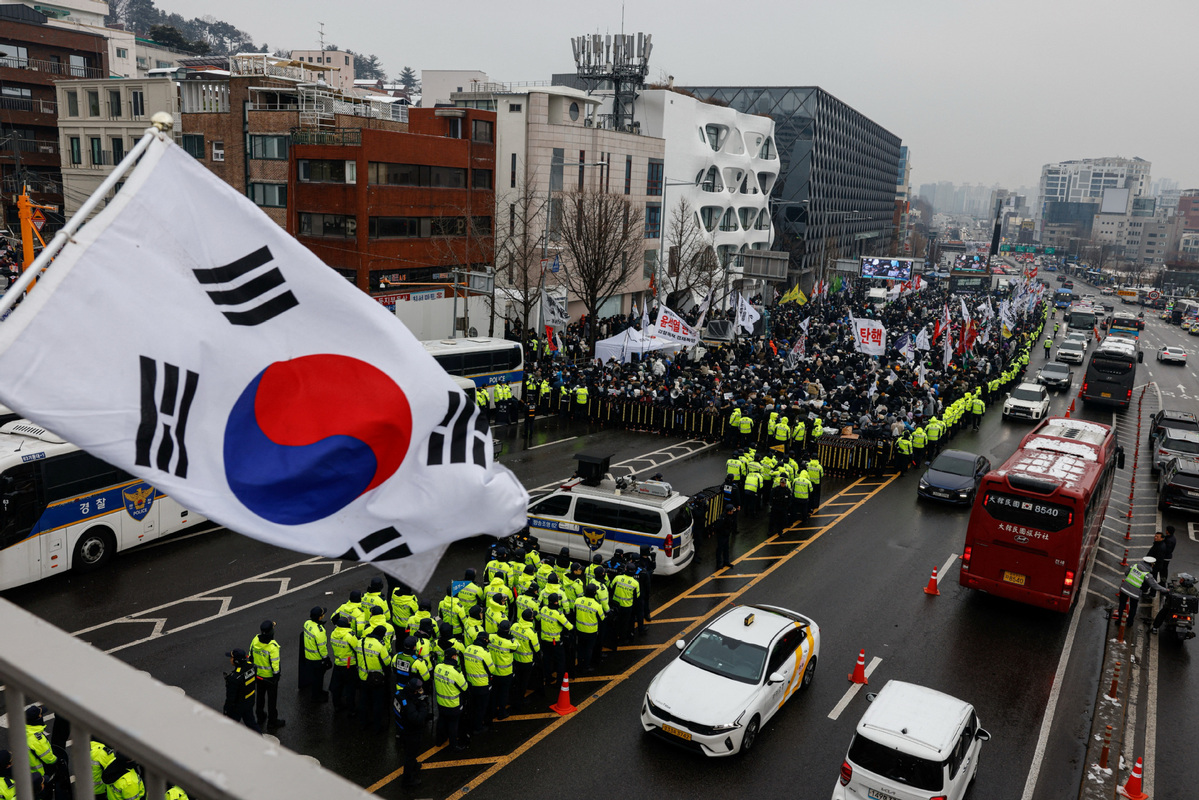
SEOUL -- Chief of South Korea's presidential security service, Park Jong-joon, on Sunday vowed to keep blocking an attempt to arrest the impeached President Yoon Suk-yeol.
If the security service, which puts its top priority on the president's absolute safety, complied with the execution of the arrest warrant against Yoon, it would have been a dereliction of duty and an abandonment of presidential security, Park said in a statement.
Park noted that he would accept any judicial responsibility for his possible errors in his decision to let security service agents confront a group of investigators who raided the presidential residence in central Seoul on Friday to proceed with the warrant to detain Yoon.
After the security service's obstruction of justice led to the botched attempt to arrest Yoon, a wave of denunciations emerged describing the security service as private bodyguards, even with calls that the security service should be disbanded.
The impeachment motion against Yoon was passed in the National Assembly on Dec 14 last year, and was delivered to the constitutional court to deliberate it for up to 180 days, during which Yoon's presidential power is suspended.
Yoon, who was named by investigative agencies as a suspected ringleader on insurrection charge, declared martial law on the night of Dec 3, but it was revoked by the National Assembly hours later.
SEOUL -- South Korea's constitutional court said Friday that it will hold hearings for President Yoon Suk-yeol's impeachment trial on Jan 14 and Jan 16.
A constitutional court justice said in the second preparatory hearing earlier in the day that the pretrial hearing was concluded with the second one to hold a formal hearing on Jan 14 for the launch of formal proceedings.
The justice noted that the second formal hearing was set on Jan 16 in preparation for the absence of the defendant, referring to the impeached president.
Legal representatives for Yoon demanded further discussions in additional preparatory hearings, but it was dismissed by the justice.
Legal representatives for the National Assembly denounced Yoon's defense counsel for intending to delay the court proceedings.
An impeachment motion against Yoon was passed by the National Assembly on Dec 14 last year and delivered to the constitutional court to deliberate it for up to 180 days, during which Yoon's presidential power is suspended.
Yoon, who was named by investigative agencies as a suspected ringleader on insurrection charge, declared a martial law on the night of Dec 3, 2024 but it was revoked by the National Assembly hours later.
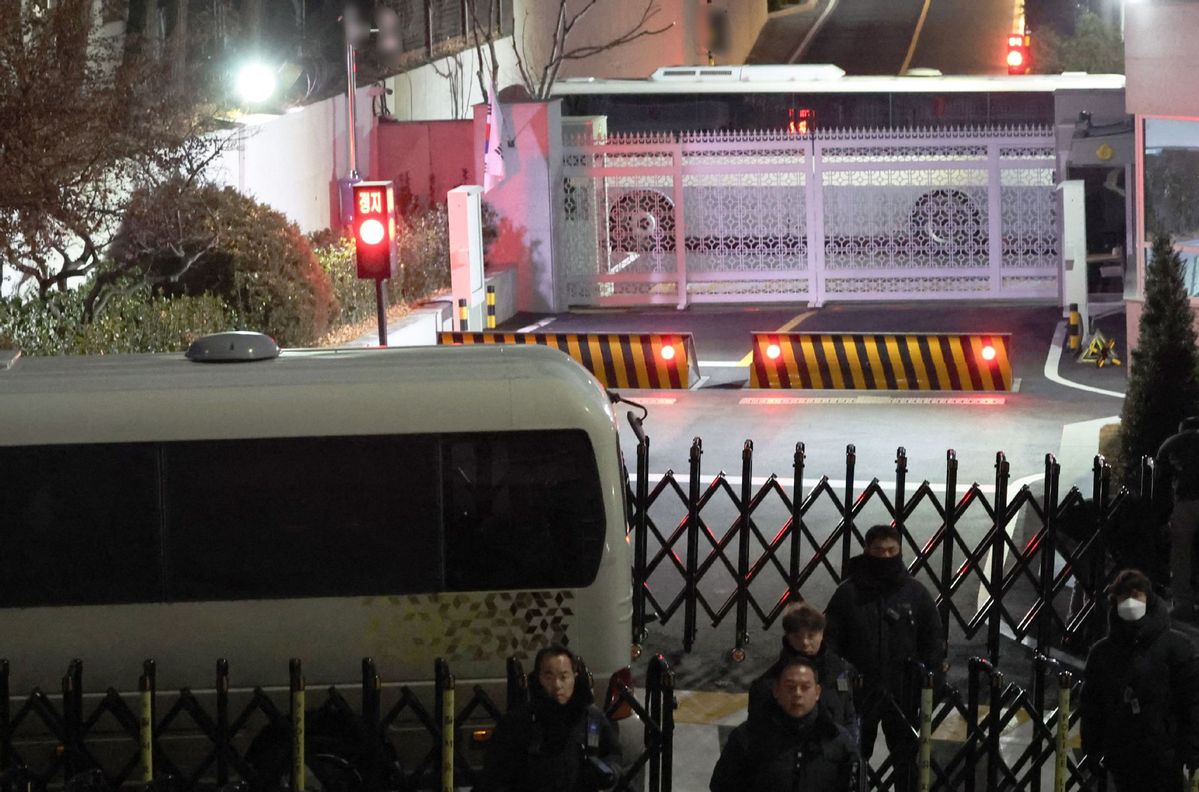
SEOUL -- South Korean investigators with the anti-corruption investigative unit left the presidential residence after failing to arrest the impeached President Yoon Suk-yeol on Friday.
The Corruption Investigation Office for High-ranking Officials (CIO) said the continued confrontation virtually made it impossible to execute the arrest warrant against Yoon, which was issued by a Seoul court on Tuesday.
The CIO noted that it stopped the execution at about 1:30 p.m. local time (0430 GMT) over concerns about the safety of investigators at the scene, expressing deep regret over the attitude of Yoon who refused to comply with legal procedures.
The investigative unit added that it will decide on future measures after relevant reviews.
A group of CIO prosecutors and investigators attempted to arrest the impeached president over his martial law imposition in the presidential residence in central Seoul on Friday, but after confronting the presidential security service agents, they had to stop proceeding with the arrest warrant.
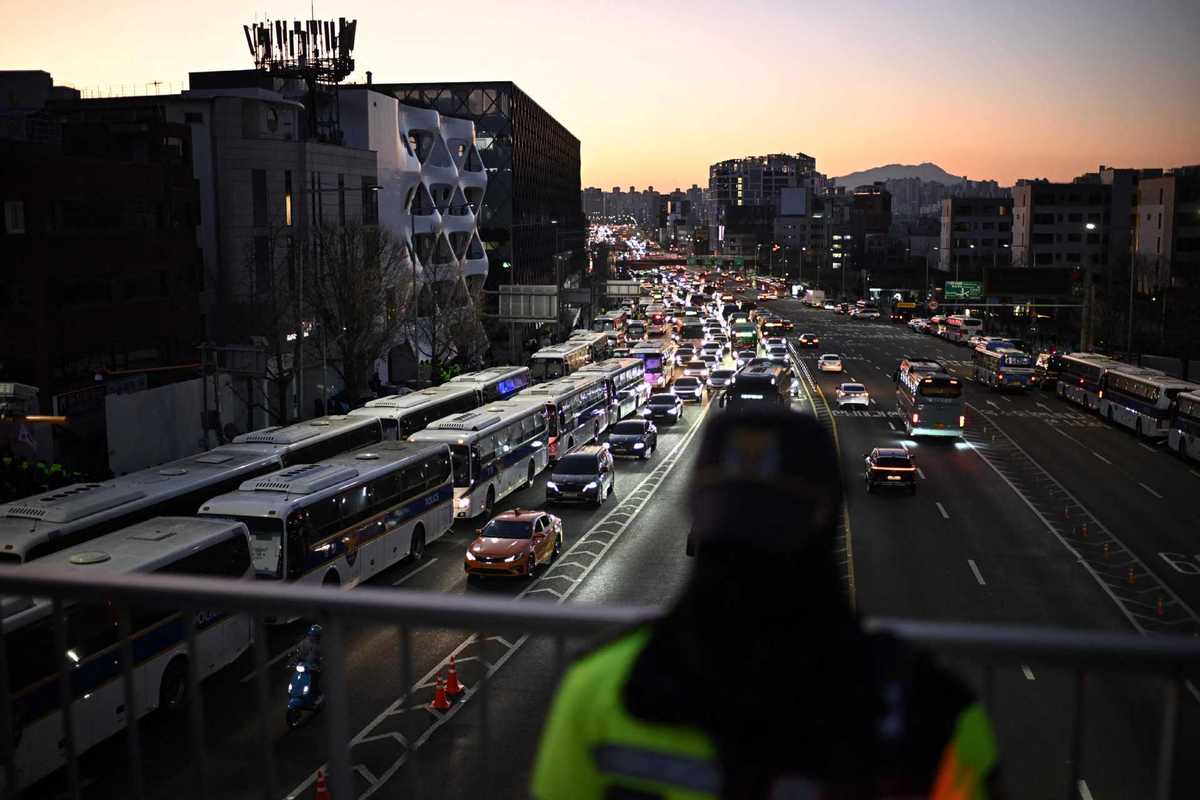
SEOUL -- A group of South Korean investigators confronted the presidential security service agents for over two hours on Friday in an attempt to arrest the impeached President Yoon Suk-yeol, according to multiple media outlets.
The prosecutors and investigators with the Corruption Investigation Office for High-ranking Officials (CIO) faced the third and last cordon of the security service inside the presidential residence in central Seoul after breaking through the second cordon of soldiers.
The chief of the security service, which protects the president at the closest range, rejected the CIO's calls to search the residence for the execution of a warrant to arrest Yoon that was issued by a Seoul court on Tuesday.
After passing through the first cordon of police officers, the investigators walked into a road at the residence's main gate around 8:02 a.m. local time (2302 GMT Thursday).
The CIO warned earlier that if the security service blocks the arrest, it would be a crime of obstruction of justice.
About 2,700 riot policemen were reportedly deployed to the residence to help proceed with the arrest warrant.
The CIO has been investigating Yoon's martial law imposition jointly with the National Office of Investigation (NOI) and the defense ministry's investigation headquarters.
Yoon, who was named by investigative agencies as a suspected ringleader on an insurrection charge, declared a martial law on the night of Dec. 3 last year, but it was revoked by the National Assembly hours later.
The impeachment motion against Yoon was passed in the National Assembly on Dec. 14 and was delivered to the constitutional court to deliberate it for up to 180 days, during which Yoon's power is suspended.
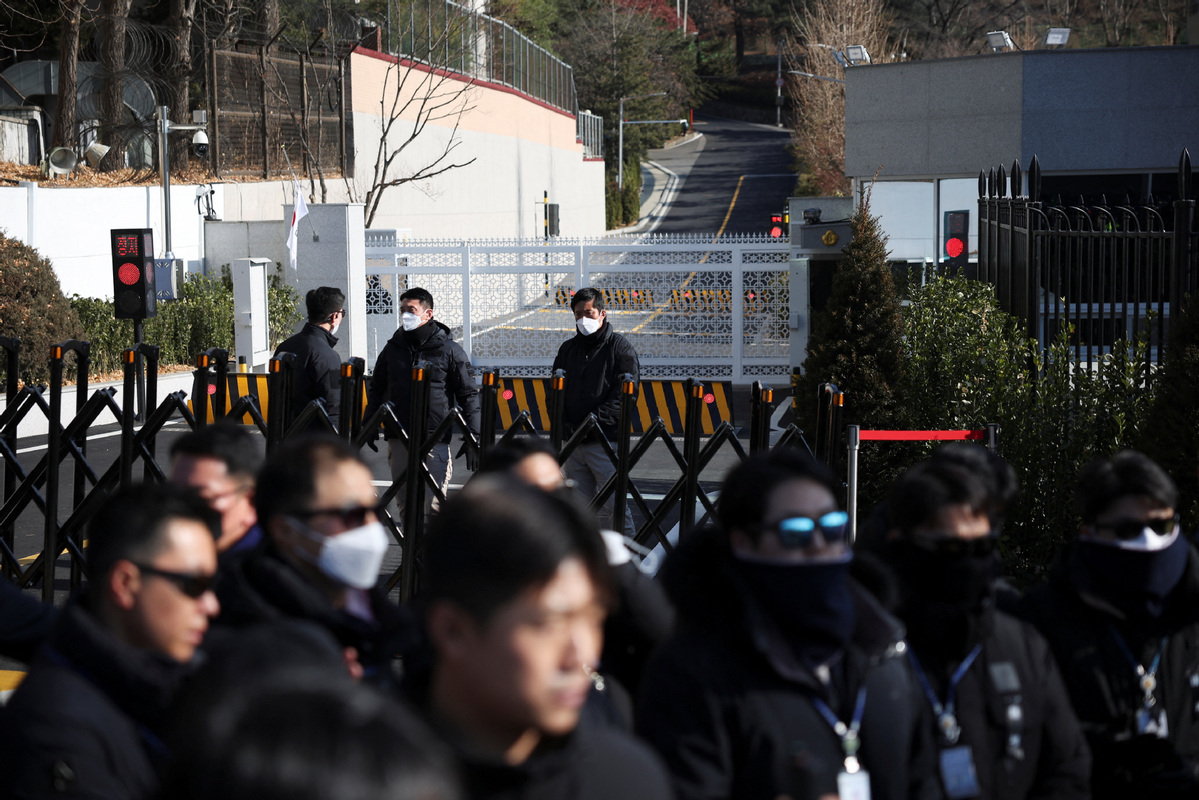
SEOUL -- South Korea's police special forces were searching the building of the ruling People Power Party in central Seoul after a threat of planting explosives, multiple media outlets said Thursday.
It was reported to the police at about 11:00 am local time (0200 GMT) that the People Power Party received a fax of threatening to install explosives in its building from an unidentified person.
The police dispatched special forces and detection dogs to search inside and outside the party's building.
Neither an explosive device nor other material had yet to be found. The police were investigating the fax sender and other details.
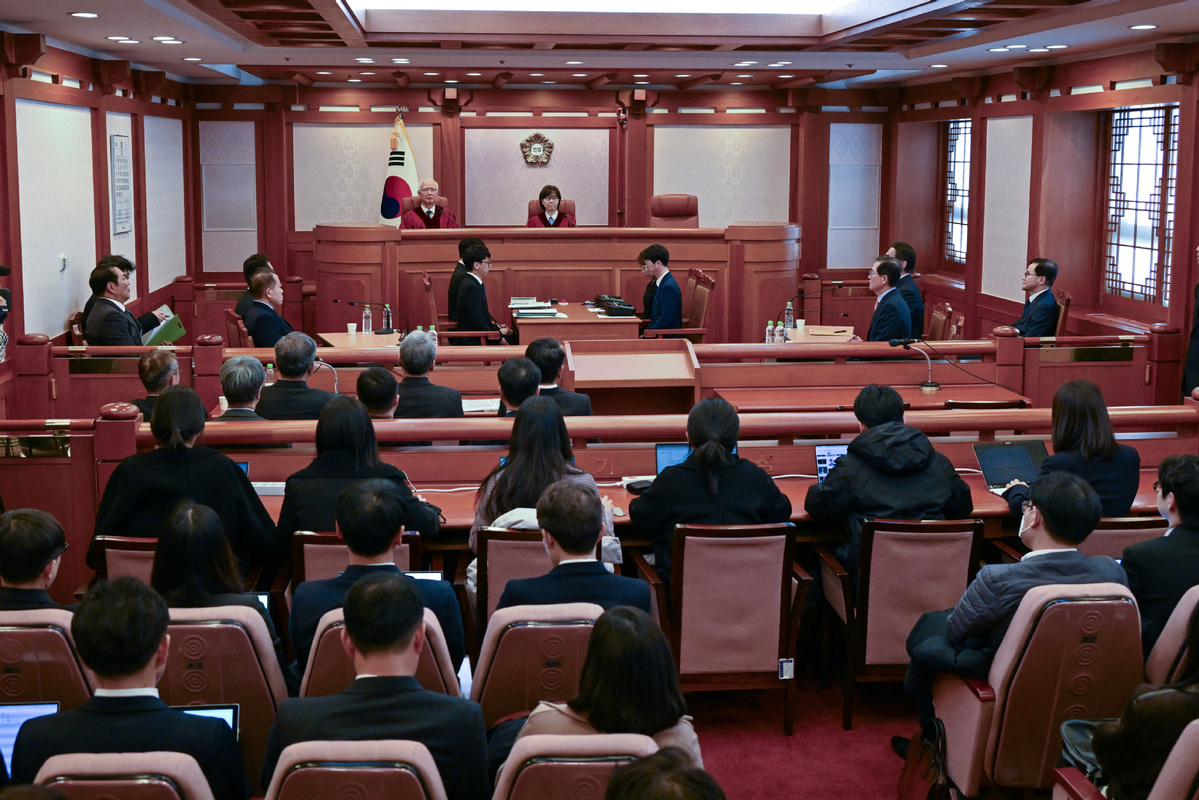
SEOUL -- South Korea's constitutional court on Tuesday called for an early appointment of justices to fill three vacancies on the nine-member bench for President Yoon Suk-yeol's impeachment trial over his martial law imposition.
A spokesperson of the court told a televised press briefing that the incumbent justices urged the "rapid completion" of the constitutional court during a meeting on Monday.
She noted that the six justices maintained their position of putting Yoon's impeachment trial as a top priority.
On Dec 26, the country's parliament voted for the appointment of the three justices, two of which were nominated by the main opposition Democratic Party, while one was nominated by the ruling People Power Party.
The appointment of the three justices, which was passed in the opposition-controlled National Assembly, is required to be ceremonially approved by the president.
Economy and Finance Minister Choi Sang-mok, who doubles as deputy prime minister for economic affairs, became an acting president following the impeachment of both President Yoon and Prime Minister Han Duck-soo.
Han was impeached by the National Assembly after officially refusing to ratify the appointment of the justices.
The impeachment motion against Yoon was passed in the National Assembly on Dec 14 and was delivered to the constitutional court to deliberate it for up to 180 days, during which Yoon's presidential power is suspended.
Yoon, who was named by investigative agencies as a suspect on insurrection charge, declared an emergency martial law on the night of Dec 3, but it was revoked by the National Assembly hours later.
To oust Yoon from office, at least six out of nine constitutional court justices are required to uphold the impeachment motion.
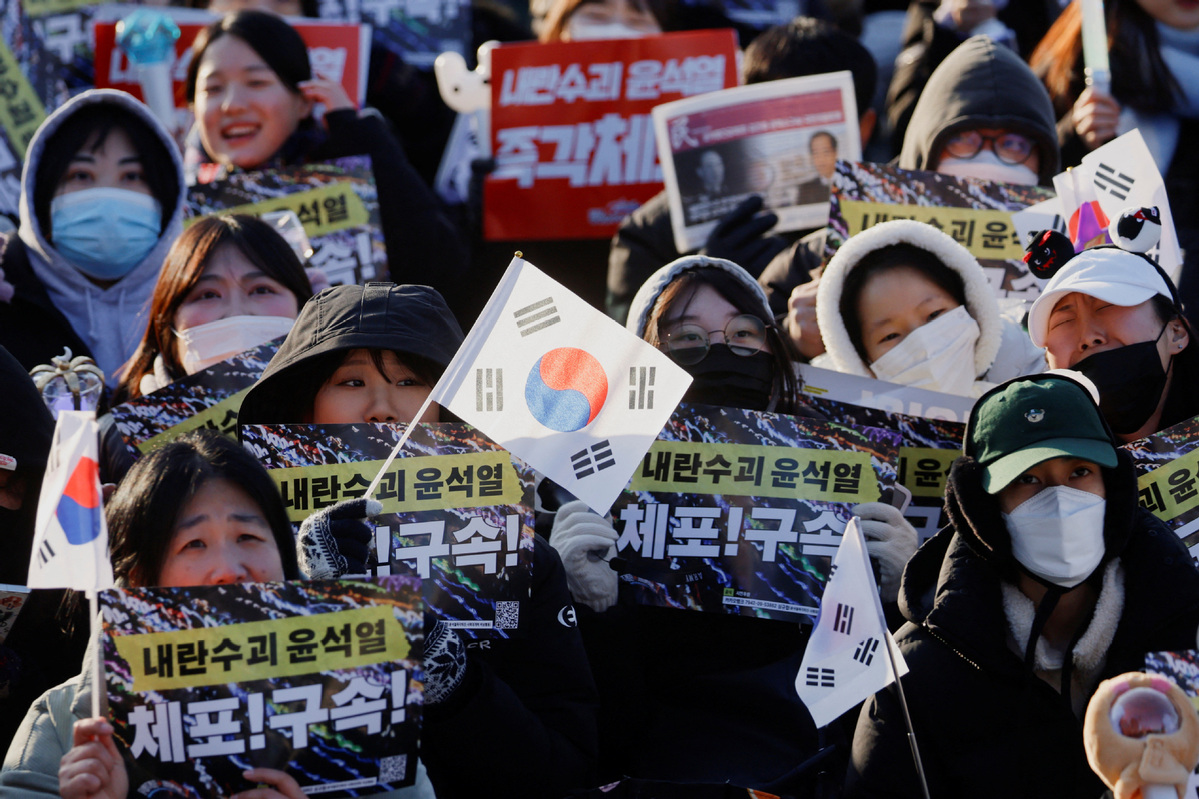
SEOUL -- A South Korean court issued a warrant to arrest the impeached President Yoon Suk-yeol and search the presidential residence, the joint investigation unit said Tuesday.
The investigation unit, consisting of Corruption Investigation Office for High-ranking Officials (CIO), National Office of Investigation (NOI) and the defense ministry's investigation headquarters, said in a short notice that the issuance of arrest and search warrants against Yoon was confirmed earlier in the morning.
The unit added that no schedule was set for the execution of the warrants, which in normal cases are valid for one week from the date of issuance.
It marked the first time in the country's modern history that an arrest warrant was issued against a sitting president.
The joint investigation unit requested the warrants against Yoon to the Seoul Western District Court on insurrection and other charges the previous day.
The unit asked Yoon to appear for questioning three times on Dec. 18, Dec. 25 and Dec. 29, but the impeached leader refused to receive summonses and submit documents for the appointment of his defense counsel.
Yoon's side submitted written opinion and appointed defense counsel to the Seoul Court just hours after the request for issuance of the warrants.
Yoon was named by investigative agencies as a suspected ringleader on insurrection charge.
Yoon said in a televised address on Dec. 12 that he will not avoid his legal and political responsibility for the martial law that was declared by Yoon on the night of Dec. 3 but was revoked by the National Assembly hours later.
The impeachment motion against Yoon was passed in the National Assembly on Dec. 14 and was delivered to the constitutional court to deliberate it for up to 180 days, during which Yoon's power is suspended.
SEOUL -- South Korea's joint investigation unit said Monday that it sought a warrant to arrest the impeached President Yoon Suk-yeol over his martial law imposition.
The investigation unit, consisting of Corruption Investigation Office for High-ranking Officials, National Office of Investigation and the defense ministry's investigation headquarters, said in a short notice that it requested the arrest warrant for Yoon at midnight to the Seoul Western District Court.
It marked the first time in the country's modern history that an arrest warrant has been filed against an incumbent president.
The unit asked Yoon to appear for questioning three times on Dec 18, Dec 25 and Dec. 29, but Yoon's side refused to receive summons while having yet to submit documents for the appointment of his defense counsel.
Yoon was named by investigative agencies as a suspected ringleader on insurrection charge.
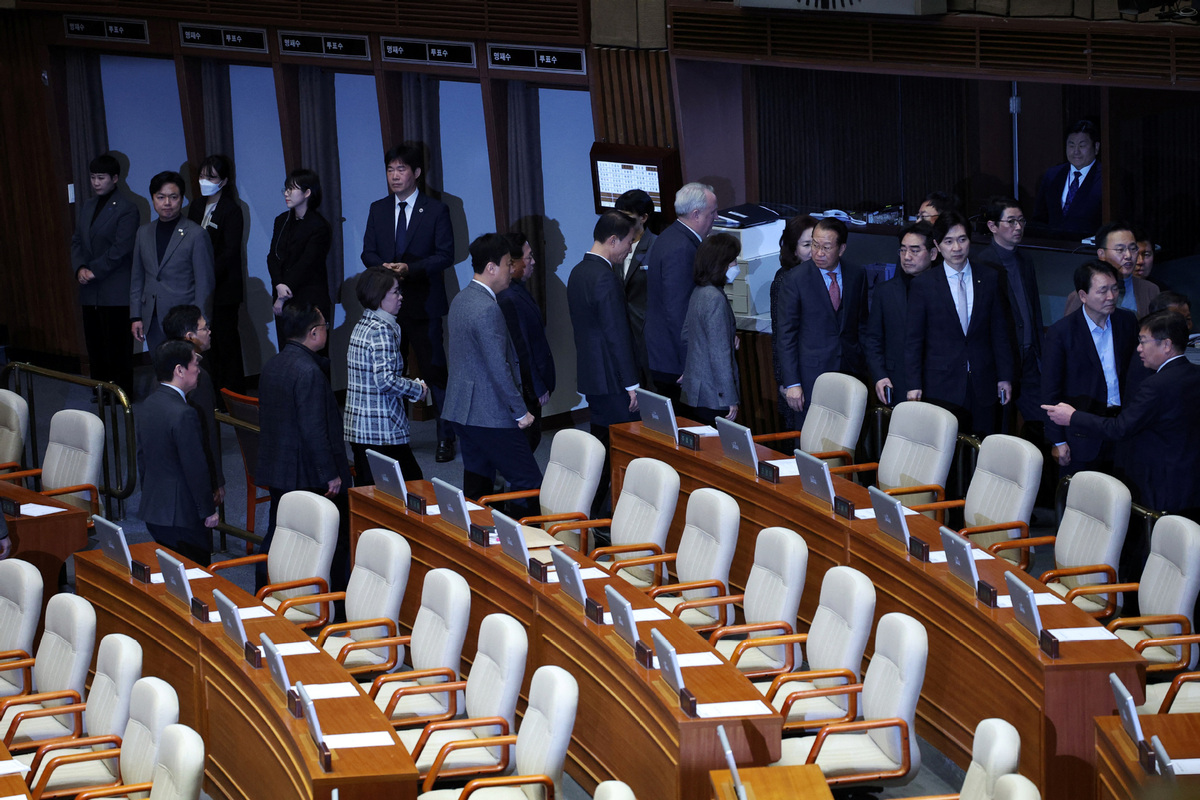
SEOUL -- South Korea's Minister of Economy and Finance Choi Sang-mok is set to begin his scheduled duties as acting president on Friday, Yonhap news agency reported, citing his office.
Choi, also the deputy prime minister for economic affairs, is poised to assume the role following the suspension of acting president Han Duck-soo's duties, after the opposition-controlled National Assembly passed a motion to impeach Han earlier Friday, the report said.
The Finance Ministry said Choi plans to have a meeting with Han, followed by a phone call with the chairman of the Joint Chiefs of Staff, and order instructions to the government ministers, the report said.
The acting president is also scheduled to deliver a written address to the public and convene the National Security Council, the report added, citing the ministry.
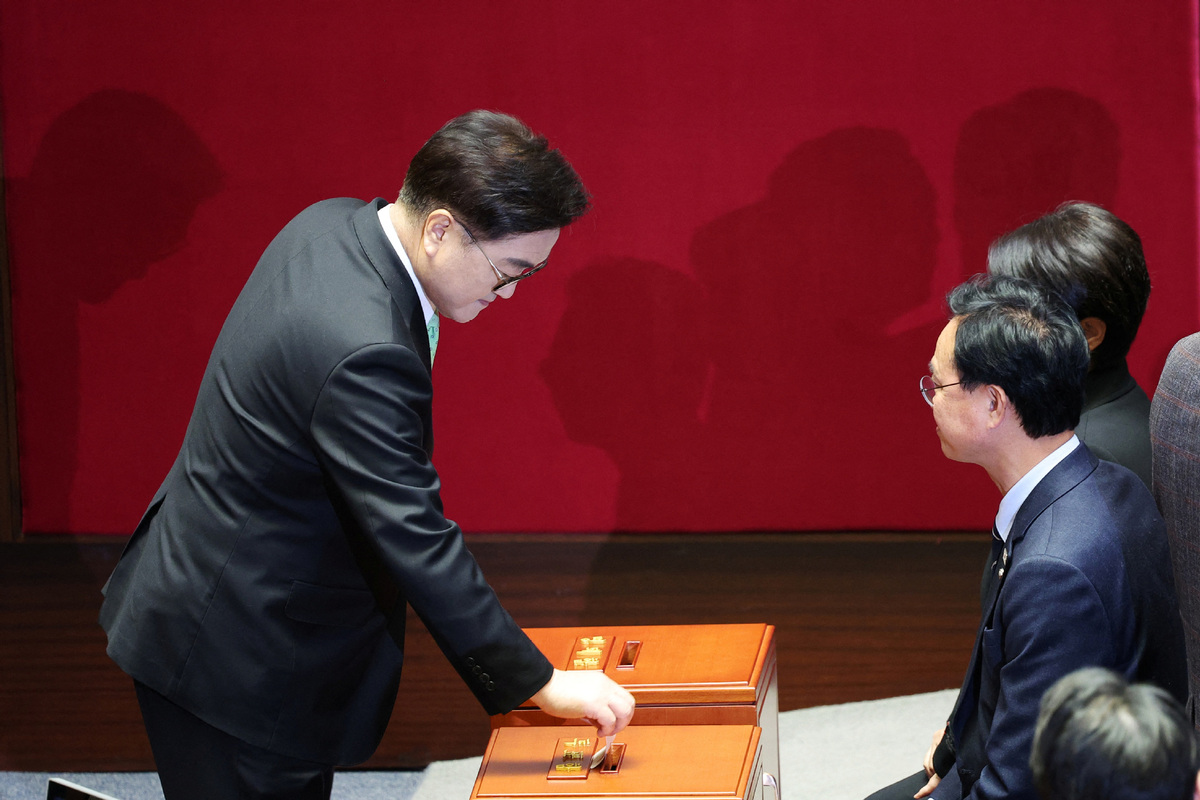
SEOUL -- South Korea's opposition-controlled parliament voted Friday to impeach Prime Minister Han Duck-soo who had been serving as acting president following President Yoon Suk-yeol's impeachment.
National Assembly Speaker Woo Won-shik said in a televised plenary session that the motion to impeach Han was passed with 192 votes in favor in the 300-member unicameral parliament.
It was the first time in the country's modern history that an impeachment motion against an acting president is put to a vote and passed in the National Assembly.
Before leaving the parliamentary chamber to boycott the vote, 108 lawmakers of the ruling People Power Party chanted in union in front of the parliamentary speaker, "Null and void," and "Resign, speaker."
The ruling and opposition parties had been divided over the requirement for the acting president's impeachment.
The People Power Party claimed that 200 lawmakers should vote for the impeachment as it applies to the president's impeachment, but the opposition parties said a majority of 151 votes are needed as Han is a member of the cabinet.
With the parliamentary approval, Han's duty will be suspended until the constitutional court completes deliberation on it.
Minister of Economy and Finance Choi Sang-mok, who doubles as deputy prime minister for economic affairs, will assume an acting presidency.
Han's impeachment came after he officially refused to approve the appointment of three constitutional court justices who will fill vacancies on the nine-member bench for Yoon's impeachment trial.
The impeachment motion against Yoon was passed in the National Assembly on Dec. 14 and was delivered to the constitutional court to deliberate it for up to 180 days, during which Yoon's presidential power is suspended.
Yoon, who was named by investigative agencies as a suspect on insurrection charge, declared an emergency martial law on the night of Dec. 3, but it was revoked by the National Assembly hours later.
To oust Yoon from office, at least six out of nine constitutional court justices are required to uphold the impeachment motion.
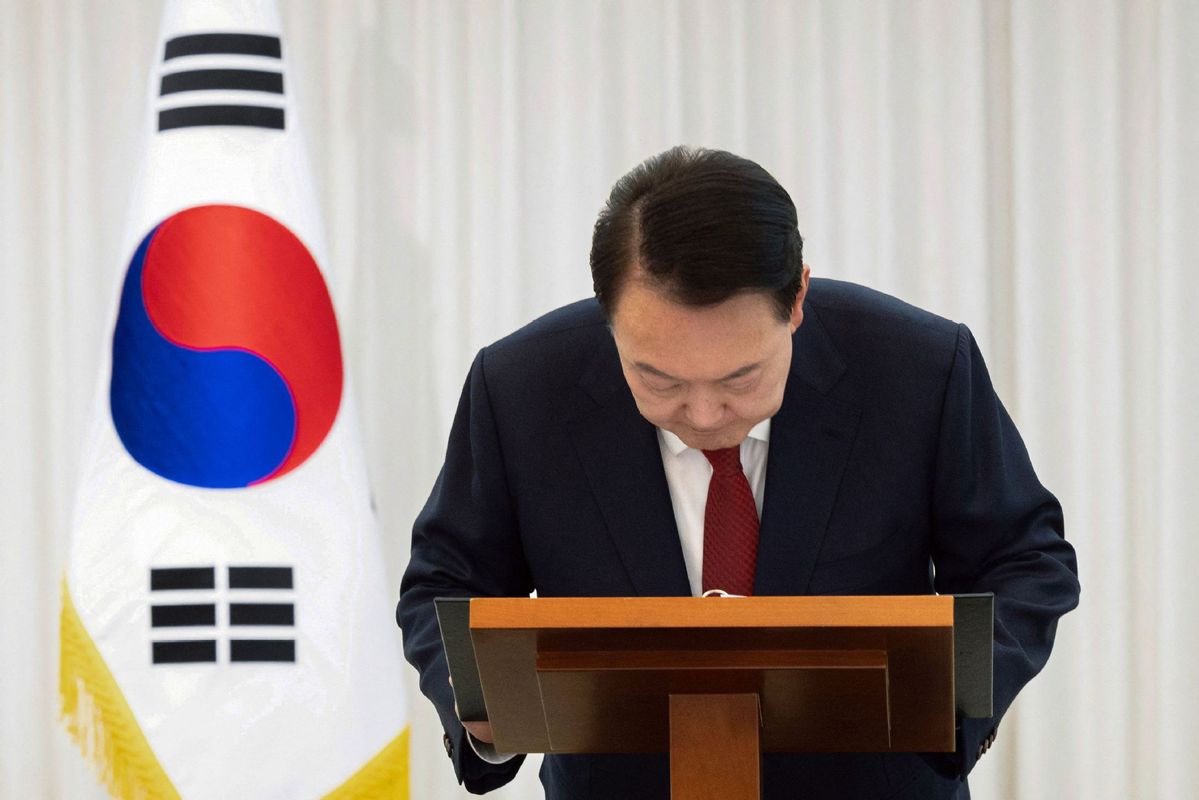
SEOUL -- South Korea's constitutional court started the first preparatory hearing Friday for a trial on President Yoon Suk-yeol's impeachment that was passed by the parliament earlier this month over Yoon's short-lived martial law imposition.
The pre-trial hearing began at about 2:15 pm local time to let legal representatives of both Yoon and the National Assembly submit the lists of witnesses and evidence and adjust dates for future proceedings.
The National Assembly was represented by the chief of the legislation and judiciary committee and other lawyers, while Yoon's side appointed a team of defense counsels hours before the preparatory hearing.
Yoon insisted that his martial law declaration was an act of governance, but the National Assembly called it an act of insurrection.
The impeachment motion against Yoon was passed by the National Assembly on Dec 14 and delivered to the constitutional court to deliberate it for up to 180 days, during which Yoon's presidential power will be suspended.
Yoon declared an emergency martial law on the night of Dec 3 but it was revoked by the National Assembly hours later.
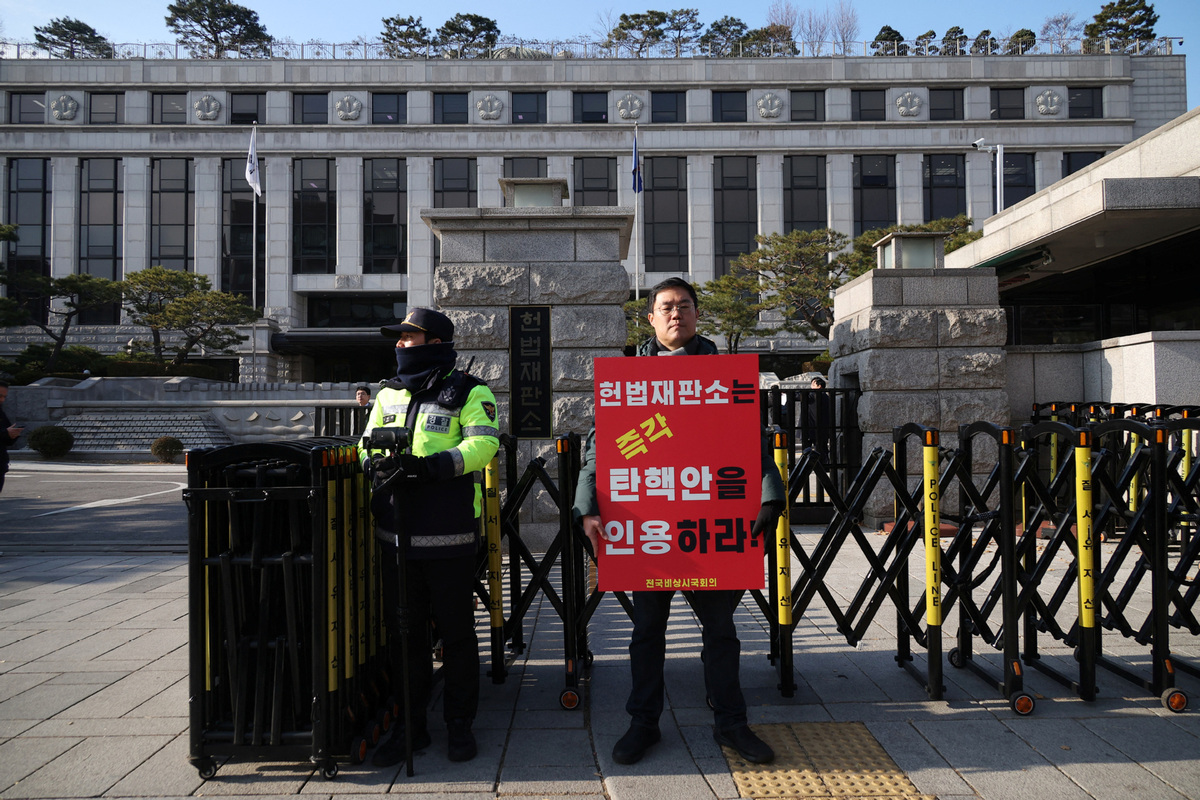
SEOUL -- South Korea's parliament on Thursday voted for the appointment of three constitutional court justices to fill vacancies on the nine-member bench for President Yoon Suk-yeol's impeachment trial over his martial law imposition.
Two justices were nominated by the main liberal opposition Democratic Party, and one was nominated by the ruling conservative People Power Party, most of whose lawmakers boycotted the vote.
The impeachment motion against Yoon was passed in the National Assembly on Dec 14 and was delivered to the constitutional court to deliberate it for up to 180 days, during which Yoon's presidential power is suspended.
Yoon, who was named by investigative agencies as a suspect on insurrection charge, declared an emergency martial law on the night of Dec 3, but it was revoked by the National Assembly hours later.
To oust Yoon from office, at least six out of nine constitutional court justices are required to uphold the impeachment motion.
Of nine justices, three are nominated by the National Assembly, three by the president and three by chief justice of the Supreme Court.
The appointment of the three justices, which was passed in the opposition-controlled National Assembly, needs to be ceremonially approved by the president.
Prime Minister Han Duck-soo, who became an acting president following Yoon's impeachment, officially refused to approve the appointment, saying in an address earlier in the day that he will delay the approval until the ruling and opposition parties reach an agreement.
The Democratic Party said it will table an impeachment motion against Han and report it to the National Assembly later in the day, planning to vote on the motion Friday.
SEOUL -- South Korea's main liberal opposition Democratic Party said on Thursday that it will vote on a motion to impeach Prime Minister Han Duck-soo on Friday.
Park Chan-dae, the party's floor leader, said in a statement that his party had submitted the impeachment motion against Han and reported it to the National Assembly's plenary session.
Han became an acting president following President Yoon Suk-yeol's impeachment over his martial law declaration on the night of Dec. 3 which was revoked by the National Assembly hours later.
Yoon was impeached by the National Assembly on Dec. 14. Since then, the constitutional court would deliberate it for up to 180 days, during which Yoon's presidential power is suspended.
Han said in a televised address earlier in the day that he will delay the appointment of constitutional court justices until the ruling and opposition parties reach an agreement.
The Democratic Party floor leader called Han's address as an official refusal to approve the appointment contributing to insurrection, over which investigative agencies looked into the impeached president.
Park Sung-joon, the party's deputy floor leader, told reporters that the Democratic Party will vote on the motion to impeach the prime minister during a plenary session on Friday.
The voting process was underway in the National Assembly to appoint three constitutional court justice nominees, who are required to be approved by an acting president.
SEOUL -- South Korea's impeached President Yoon Suk-yeol on Wednesday defied the second summons by a joint investigation unit for questioning over the imposition of an emergency martial law, Yonhap news agency reported.
The unit, composed of the police, the defense ministry's investigation headquarters and the Corruption Investigation Office for High-ranking Officials (CIO), sent its second summons to Yoon last Friday, requesting him to appear for questioning by 10:00 a.m. local time on Wednesday as part of its investigation into his short-lived imposition of the martial law on Dec. 3.
The embattled president did not comply with the CIO's first summons last week.
The CIO was currently planning to wait for Yoon's possible appearance later in the day, Yonhap said.
The corruption investigative body said it will make a decision as early as Thursday on whether to send summons for the third time if Yoon refuses to show up for questioning on Wednesday, Yonhap added.
Yoon was named by investigative agencies as a suspect on a rebellion charge following the martial law imposition that was revoked by the National Assembly hours later.
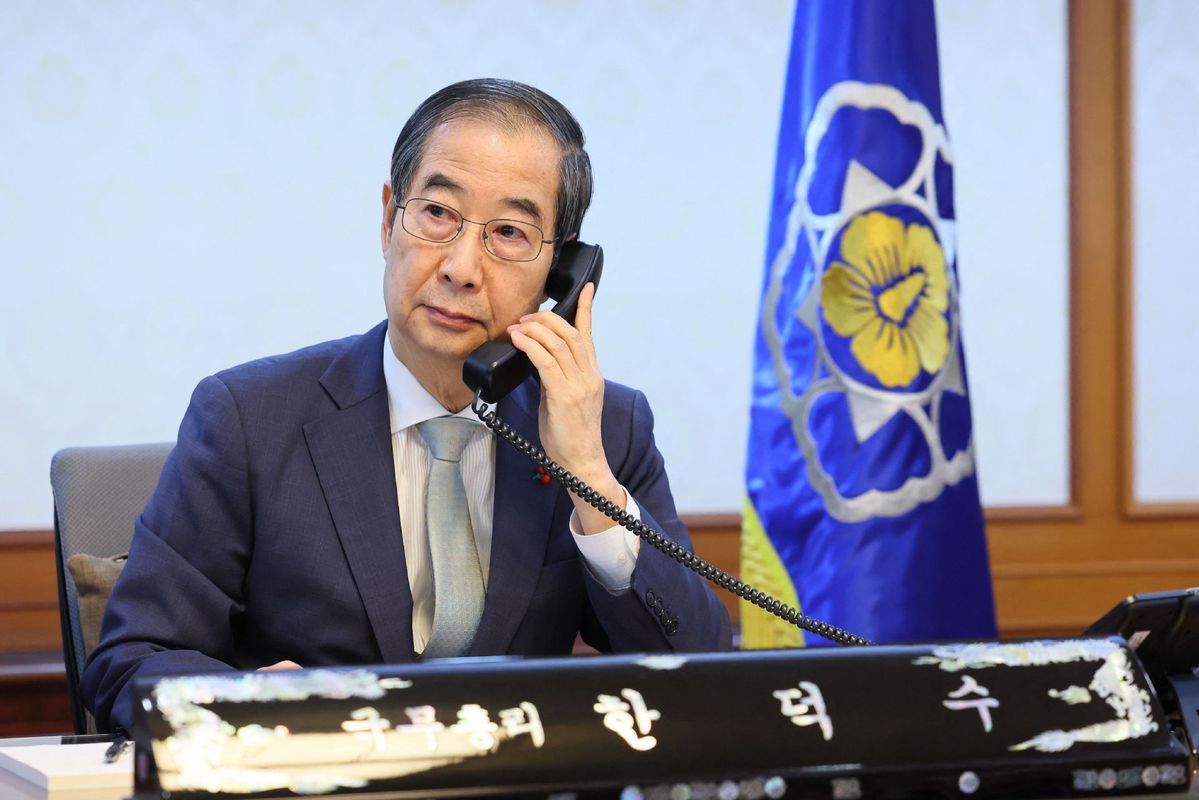
SEOUL - South Korea's main liberal opposition Democratic Party will submit a motion on Tuesday to impeach Prime Minister Han Duck-soo, who became the acting president following the impeachment of President Yoon Suk-yeol, according to multiple media outlets.
The party's floor spokesman told reporters right after the general meeting of its lawmakers that the party unanimously decided to table the motion later in the day and report it to the National Assembly's plenary session on Thursday.
Park Chan-dae, floor leader of the Democratic Party, said earlier in the day that his party would immediately launch impeachment proceedings against Han who made it clear that he will not promulgate bills to appoint independent counsels and investigate insurrection charge for the impeached president and scandals involving his wife.
The two bills were passed through the National Assembly on Dec 12, and the Democratic Party had warned that if Han fails to promulgate the bills by Dec 24, it would impeach him.
Yoon, who was named by investigative units as a suspect on treason charge, declared an emergency martial law on the night of Dec 3, but it was revoked by the National Assembly hours later.
The impeachment motion against Yoon was passed in the National Assembly on Dec 14 and was delivered to the constitutional court to deliberate it for up to 180 days, during which Yoon's presidential power was suspended.
Yoon has struggled with scandals involving his wife Kim Keon-hee during a presidential campaign and since he won the single five-year presidency in May 2022.
Kim was suspected of having been involved in stock price manipulation to gain illicit profits while having interfered in candidate nominations for the 2022 by-elections and the 2024 parliamentary elections and even in public opinion manipulation during the 2022 presidential election.
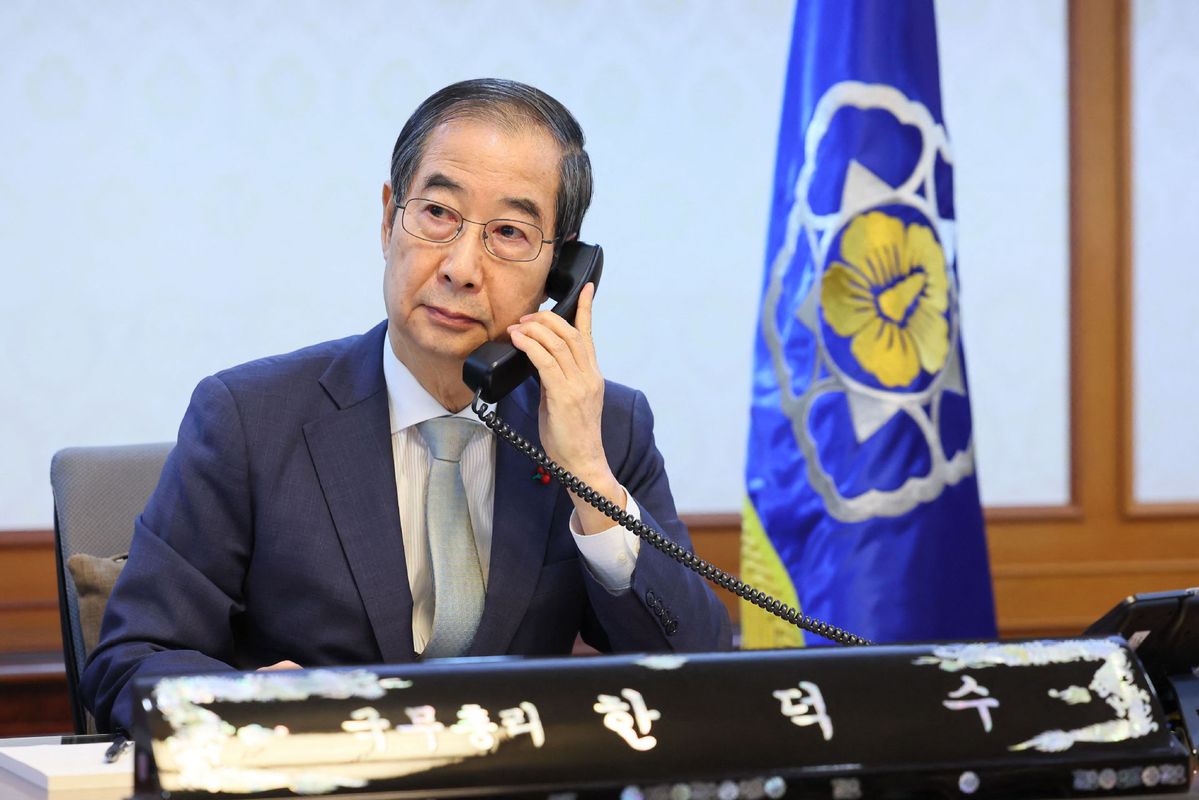
SEOUL -- South Korea's main opposition Democratic Party will immediately launch impeachment proceedings against Prime Minister Han Duck-soo who became the acting president following President Yoon Suk-yeol's impeachment over his botched martial law imposition, the party's floor leader said Tuesday.
Park Chan-dae, floor leader of the opposition party, said in a televised party meeting that the party will promptly start impeachment proceedings against Han who made it clear that he would not promulgate bills to appoint special counsels and investigate insurrection charges for the impeached president and scandals involving his wife.
The two bills were passed by the National Assembly on Dec. 12, and the Democratic Party had warned that if Han fails to promulgate the bills by Dec. 24, it would impeach the acting president.
Yoon, who was named by investigative units as a suspect on a treason charge, declared an emergency martial law on the night of Dec. 3, but it was revoked by the National Assembly hours later.
The impeachment motion against Yoon was passed by the National Assembly on Dec. 14 and delivered to the constitutional court to deliberate it for up to 180 days, during which Yoon's presidential power will be suspended.
Yoon has struggled with scandals involving his wife Kim Keon-hee during a presidential campaign and since he won the single five-year presidency in May 2022.
Kim was suspected of having been involved in stock price manipulation to gain illicit profits while having interfered in candidate nominations for the 2022 by-elections and the 2024 parliamentary elections and even in public opinion manipulation during the 2022 presidential election.

SEOUL -- South Korea's constitutional court said Monday that it will hold the first pretrial hearing over President Yoon Suk-yeol's impeachment on Friday as scheduled.
A court official told a televised press conference that the first preliminary hearing would be held on Dec 27 as planned as the court deemed the impeachment notice delivered to Yoon, who repeatedly defied the delivery.
The official said the delivery was already effective on Dec 20 when all relevant documents arrived, calling for Yoon to send his written answers to the court by Friday.
The presidential security service had refused to receive the documents related to Yoon's impeachment trial, such as request to appear in court and schedule for pretrial hearings.
The impeachment motion against Yoon was passed in the National Assembly on Dec 14 and was delivered to the constitutional court to deliberate it for up to 180 days, during which Yoon's presidential power will be suspended.
Yoon was named by investigative agencies as a suspect on a rebellion charge following his martial law imposition on the night of Dec 3, which was revoked by the National Assembly hours later.
SEOUL -- South Korea's joint investigation unit sent its second summons Friday to impeached President Yoon Suk-yeol, according to Yonhap news agency.
The unit, composed of the police, the defense ministry's investigation headquarters and the Corruption Investigation Office for High-ranking Officials (CIO), called on Yoon to appear for questioning on Dec. 25 over insurrection charge.
The summons were sent by express and electronic mails to the presidential residence and the presidential office.
The CIO attempted to deliver its first summons to the embattled president last week, but it failed as the presidential security service refused to receive it.
The prosecution separately sent its second summons to ask Yoon to appear for questioning on Saturday, but it was actually invalid after the prosecution transferred the case to the CIO earlier this week.
The CIO reportedly planned to consider seeking an arrest warrant against Yoon if Yoon continues to avoid receiving the summons or fails to comply with the summons for no justifiable reasons.
Yoon was named by investigative agencies as a suspect on rebellion charge following his martial law imposition on the night of Dec. 3 that was revoked by the National Assembly hours later.
The impeachment motion against Yoon was passed by the National Assembly on Dec. 14 and delivered to the constitutional court to deliberate it for up to 180 days, during which Yoon's presidential power is suspended.
